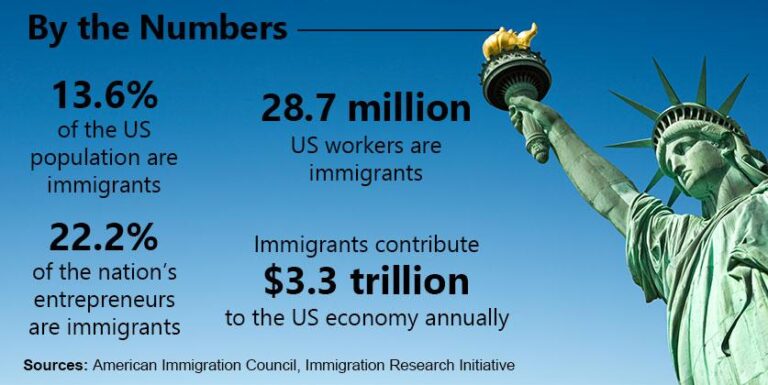Immigration: A Cornerstone of AmericaŌĆÖs Economic Expansion
Immigrant Influence Across Vital Economic Sectors
Immigrants play an essential role in propelling the United StatesŌĆÖ current economic growth, energizing industries such as technology, healthcare, agriculture, and hospitality. Their drive for entrepreneurship has sparked the creation of countless small and medium enterprises, generating employment opportunities and fostering innovation in both metropolitan and rural communities. Additionally, immigrant labor addresses critical workforce shortages, enabling businesses to scale operations and satisfy increasing consumer demands, thereby sustaining economic momentum.
Recent statistics illustrate the significant footprint of immigrant workers in key industries:
| Industry | Immigrant Workforce Percentage | Contribution to Sector Growth |
|---|---|---|
| Technology | 32% | +13% |
| Healthcare | 27% | +16% |
| Agriculture | 38% | +11% |
| Hospitality | 42% | +19% |
This diverse labor pool not only meets immediate economic demands but also enriches industries with varied skills and perspectives, enhancing long-term economic resilience. As the U.S. economy continues to thrive, the indispensable role of immigrants highlights the necessity for inclusive policies that support their ongoing contributions.
Immigration as a Catalyst for Innovation and Employment Growth
Immigrants have historically been at the forefront of American innovation, infusing the economy with fresh ideas and specialized expertise. Studies reveal that immigrant entrepreneurs are nearly twice as likely to launch new ventures compared to native-born individuals, invigorating sectors from advanced manufacturing to digital technology. Their impact is evident in the surge of patents, startups, and pioneering research that continuously reshape the economic landscape. The integration of global talent expands the workforce and nurtures a culture of creativity and adaptability amid shifting market conditions.
- Startups and innovation: Over 45% of the top 500 U.S. companies were founded by immigrants or their descendants.
- STEM workforce: Immigrants constitute nearly one-third of scientists, engineers, and IT professionals nationwide.
- Employment generation: Companies established by immigrants employ millions across diverse industries.
| Industry | Immigrant Workforce Share | Job Market Impact |
|---|---|---|
| Technology | 36% | Creation of high-skilled jobs in major urban centers |
| Healthcare | 22% | Filling critical frontline and specialized roles |
| Construction | 28% | Driving infrastructure development nationwide |
Beyond entrepreneurship, immigrants complement native-born workers by occupying essential positions, fostering a more dynamic and productive labor market. This collaboration enhances overall productivity and contributes to wage growth. As industries evolve and demand specialized skills, immigrants are uniquely positioned to bridge these gaps. Recognizing this, policymakers are advocating for reforms that streamline legal immigration pathways and reduce barriers, ensuring the U.S. remains competitive on the global stage.
Essential Policy Changes to Maximize Immigrant Economic Impact
To sustain economic growth and fully leverage immigrant potential, comprehensive policy reforms are imperative. Simplifying immigration procedures to provide faster, clearer routes to legal status will unlock a wider array of talents and innovations. Equally important is expanding access to education, language acquisition, and vocational training, empowering immigrants to meet the skill demands of todayŌĆÖs high-growth industries. Failing to act risks underutilizing a vital resource, potentially hindering economic progress and exacerbating social inequalities.
Additionally, addressing social determinants such as affordable housing, healthcare accessibility, and community services is critical to fostering environments where immigrants can thrive. Experts emphasize the following priority areas for reform:
- Streamlined citizenship and work authorization processes
- Investment in multilingual education and skills training
- Affordable housing programs tailored to immigrant needs
- Expanded healthcare coverage to improve public health outcomes
| Reform Focus | Projected Economic Benefit |
|---|---|
| Legal Status Simplification | Estimated 4.5% GDP growth over five years |
| Workforce Development | 10-12% increase in labor productivity |
| Affordable Housing | Improved workforce retention and urban stability |
| Healthcare Access | Reduced absenteeism and enhanced public health |
Aligning Immigration with Workforce Needs for Sustainable Prosperity
The accelerating economic growth underscores immigrationŌĆÖs vital role in fulfilling the evolving demands of the American labor market. As technological innovation and demographic changes reshape industries, immigrant workers fill indispensable roles across healthcare, manufacturing, and beyond, ensuring businesses remain competitive and innovative. Their diverse experiences and viewpoints also contribute to a more resilient and creative economic environment.
To capitalize on these advantages, a coordinated strategy between policymakers and industry leaders is essential. Key initiatives include:
- Expanding visa categories to address skill shortages and emerging sectors
- Enhancing job training programs that integrate immigrant and native-born workers
- Encouraging regional partnerships to tackle localized labor market challenges
Implementing these measures will strengthen economic stability and cultivate a more inclusive, adaptable workforce ready to meet future challenges.
| Industry | Immigrant Workforce Percentage | Projected Growth (2025-2030) |
|---|---|---|
| Healthcare | 26% | 16% |
| Manufacturing | 20% | 9% |
| Technology | 24% | 22% |
| Agriculture | 32% | 6% |
Final Reflections: Immigration as a Pillar of Economic Vitality
As the U.S. economy continues its vigorous expansion, immigration remains a fundamental engine driving growth and innovation. The influx of diverse talent not only addresses critical labor shortages but also sparks entrepreneurship and enriches cultural dynamism. For sustained prosperity, it is crucial that policymakers and stakeholders recognize immigration as a strategic economic asset rather than solely a social issue. The evolving economic landscape clearly demonstrates that embracing immigration is key to maintaining AmericaŌĆÖs competitive edge and long-term success.







